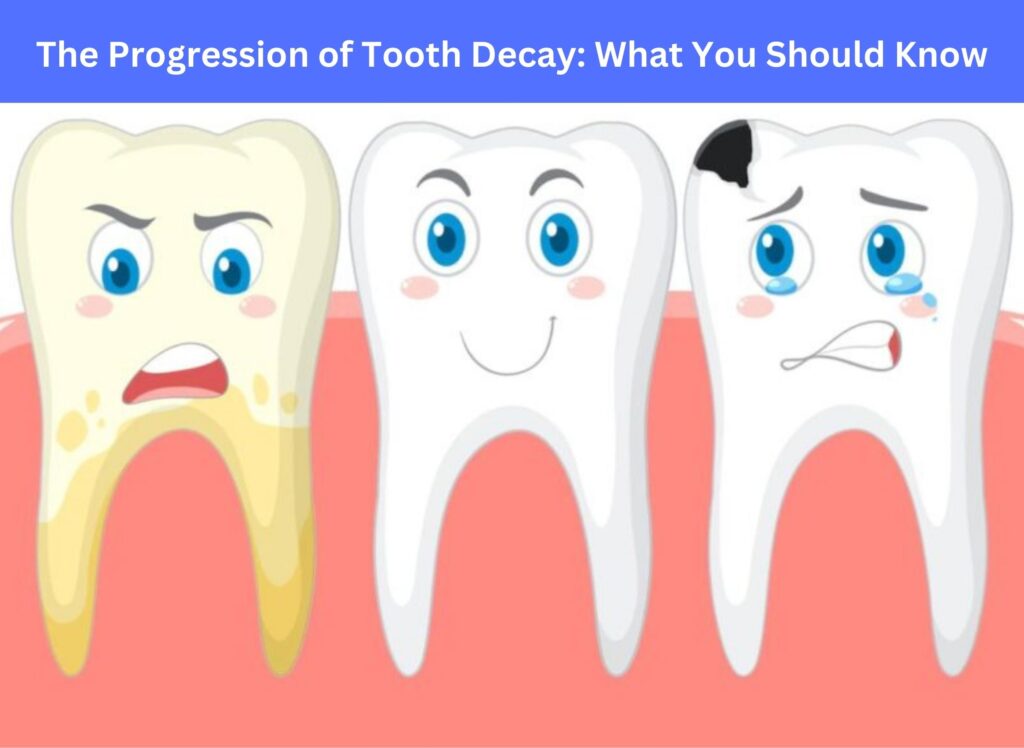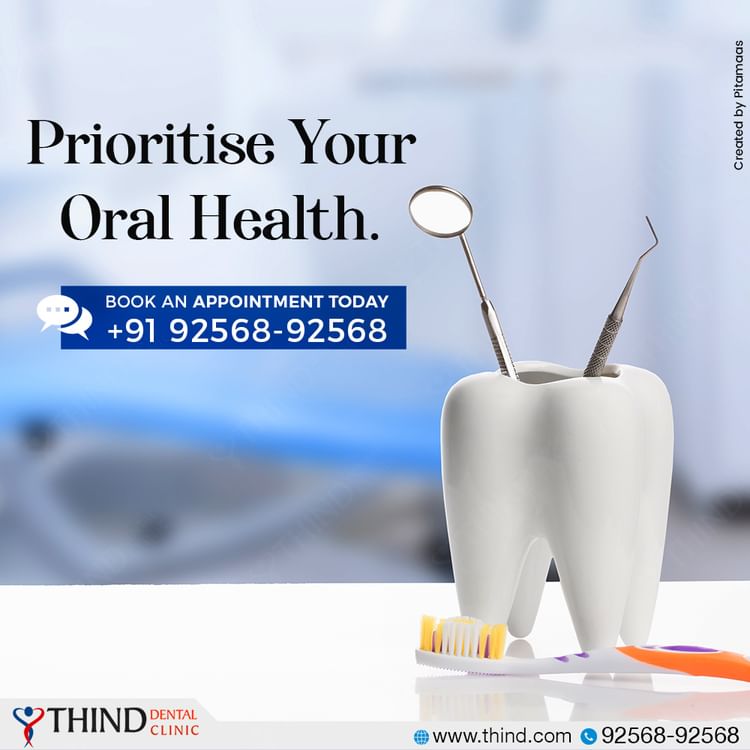Tooth decay is a common dental problem that affects people of all ages all over the world. It’s a process that begins subtly, often without noticeable symptoms, and can advance rapidly if left untreated. Understanding how tooth decay progresses is essential for maintaining optimal oral health. In this comprehensive guide, we will delve into the stages of tooth decay, explore the causes, symptoms, and risk factors, and provide insights into prevention and treatment. Thind Dental Clinic in Ludhiana is here to empower you with knowledge so you can protect your smile and overall well-being.
Stages of Tooth Decay
1. Demineralization: The Early Warning
– Demineralization is the initial stage of tooth decay. It occurs when acids produced by bacteria in dental plaque attack the enamel, the tooth’s protective outer layer.
– At this point, you may not experience any symptoms, but your dentist might detect white spots on your teeth during a check-up.
2. Enamel Erosion: Advancing Decay
– As demineralization continues, the enamel begins to erode, leading to the formation of cavities or caries.
– You may notice sensitivity to hot, cold, sweet, or acidic foods and beverages during this stage.
– Prompt treatment is crucial to prevent cavities from progressing deeper into the tooth.
3. Dentin Decay: Nearing the Core
– If left untreated, tooth decay advances to the dentin, the inner layer of the tooth.
– Symptoms intensify, with increased sensitivity, pain, and discomfort.
– Dental fillings are often necessary to restore teeth affected at this stage.
4. Pulp Involvement: Approaching the Heart of the Tooth
– In the advanced stages of decay, bacteria reach the tooth’s pulp, where nerves and blood vessels are located.
– Severe pain and potential infection are common symptoms at this stage.
– Root canal therapy or tooth extraction may be required to address the infection and preserve oral health.
Causes of Tooth Decay
Understanding the causes of tooth decay is fundamental to its prevention. The primary factors include:
1. Bacteria and Plaque: The mouth is home to various bacteria, some of which produce acids that attack tooth enamel when combined with sugars from food and beverages. This process creates dental plaque, a sticky film that adheres to teeth and harbors harmful bacteria.
2. Dietary Choices: Diets rich in sugary and starchy foods promote bacterial growth and acid production. Frequent consumption of these foods and inadequate oral hygiene increases the risk of tooth decay.
3. Poor Oral Hygiene: Inadequate brushing and flossing allow plaque to accumulate on teeth, accelerating the demineralization process.
4. Dry Mouth: Saliva plays a crucial role in neutralizing acids and re-mineralizing enamel. Conditions that lead to dry mouth, such as certain medications or medical conditions, can increase susceptibility to tooth decay.
5. Lack of Fluoride: Fluoride helps strengthen tooth enamel and make it more resistant to acid attacks. Insufficient fluoride exposure, either from toothpaste, drinking water, or professional treatments, can elevate the risk of decay.
Symptoms and Signs
Recognizing the symptoms and signs of tooth decay can prompt timely intervention. These may include:
1. Tooth Sensitivity: Increased sensitivity to hot, cold, sweet, or acidic foods and drinks.
2. Toothache: Persistent or intermittent pain, especially while chewing or biting.
3. Visible Holes or Pits: Cavities or holes on the tooth surface, may appear as dark spots.
4. Bad Breath: Persistent bad breath (halitosis) can be a sign of dental issues, including decay.
5. Unpleasant Taste: A metallic or unpleasant taste can occur when decay progresses.
Risk Factors
Several risk factors can increase your susceptibility to tooth decay:
1. Age: Children and the elderly are often more vulnerable to decay due to developing or receding gums, respectively.
2. Poor Oral Hygiene: Inadequate brushing and flossing leave dental plaque to flourish.
3. Diet: Diets high in sugar and carbohydrates provide ample fuel for bacteria.
4. Dry Mouth: Reduced saliva production can hinder the mouth’s natural defense mechanisms.
5. Medical Conditions: Certain medical conditions, such as acid reflux, eating disorders, and diabetes, can increase the risk of tooth decay.
6. Medications: Some medications, particularly those causing dry mouth, can contribute to decay.
7. Genetics: A family history of dental issues may predispose you to tooth decay.
Prevention and Treatment
Preventing tooth decay primarily involves practicing good oral hygiene, maintaining a balanced diet, and attending regular dental check-ups. Some preventive measures include:
1. Brushing: Brush your teeth at least twice daily using fluoride toothpaste.
2. Flossing: Floss daily to remove plaque and debris between teeth.
3. Balanced Diet: Limit sugary and starchy foods, opting for fruits, vegetables, and whole grains.
4. Fluoride: Use fluoride toothpaste and consider fluoride treatments as recommended by your dentist.
5. Regular Dental Visits: Attend check-ups and cleanings at Thind Dental Clinic in Ludhiana as advised by your dentist.
6. Sealants: Dental sealants can protect vulnerable areas of teeth, particularly in children.
In cases of established tooth decay, treatment options include:
1. Dental Fillings: For cavities, dentists remove the decayed portion and fill the space with a dental filling, often made of amalgam or composite resin.
2. Root Canal Therapy: When the infection reaches the tooth’s pulp, a root canal may be necessary to remove infected tissue and preserve the tooth.
3. Tooth Extraction: In severe cases where a tooth cannot be saved, extraction is performed to prevent the spread of infection.
Conclusion
Understanding the progression of tooth decay is key to preventing and addressing this common dental issue. With proactive oral hygiene, a balanced diet, and regular visits to Thind Dental Clinic in Ludhiana, you can maintain a healthy smile and protect your overall well-being. Don’t let tooth decay progress unchecked; take control of your oral health today.
For additional information or to arrange an appointment with us
You can contact us at +91-92568-92568
or visit us at:
THIND DENTAL CLINIC
11-12-13-14 H.I.G Market, Opposite Water Tank, Ludhiana, Punjab 141010.
Also Read:
Single Sitting Procedure: Painless and Affordable Dental Care at Thind Dental Clinic
Dental Care for Children: Expert Tips for Parents on Caring for Your Child’s Teeth
The Importance and Benefits of Regular Dental Checkups: Ensuring Optimal Oral Health
Professional Dental Implants: Restoring Smiles with Precision and Care at Thind Dental Clinic in Ludhiana

 Timings
Timings


